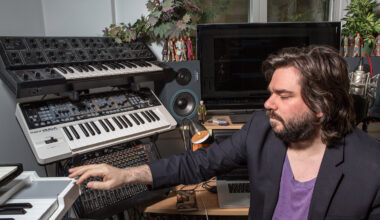Eclectic and esoteric, pinging from Aphex-esque techno to Zapp-style funk, the debut solo record from former Sink Ya Teeth vocalist Maria Uzor is an irrepressible statement of intent
In the breakneck exchange of information, it’s not easy to stay immune to influence. When I ask Maria Uzor about her creative process, she first suggests that many of her song ideas come from a blank slate, but quickly rethinks her position.
“Nothing is ever a blank slate, actually, because nothing ever exists on its own,” she decides. “There’s always an influence or something that sparked that first stage of creativity, whether you’re aware of it or not. I’ve written a song when I heard a car alarm going off and just thought… ‘Yeah!’.”
Plenty of us can relate to the rhythmic spell of everyday sounds after a night in front of a sound system, and the kinetic electronics driving Uzor’s music often give the impression she’s a dyed-in-the-wool raver. There’s a gnarly flair to the synths and a sharp angle to her beats that could easily be floating between the trees at a free party in Thetford Forest, down the road from her home city of Norwich. Appearances, of course, can be deceptive.
“No, no, I’m not actually a raver at all,” she clarifies. “People have often said that my music is very rave-influenced. Maybe it’s just in my blood, or from another life.”
The techno and electro qualities in Uzor’s debut solo album ‘Soft Cuts’ are guided less by savvy formula and much more by creative instinct. Strident beats have been a driving force in her music for a long time, but she’s used them as a medium for the stories she wants to tell rather than pursuing the expectations of the dancefloor.
“It has always been about writing songs,” Uzor confirms. “I think in terms of landscapes, soundscapes… that’s why I find it hard to stick to any particular genre, because I’m not writing for a genre – I’m writing for what I want to paint.”
Before signing to independent electronic label Castles In Space for ‘Soft Cuts’, Uzor released her solo EPs and output from her earlier band project Sink Ya Teeth on her own Hey Buffalo label. Her approach has been resolutely DIY – making her own artwork, editing her own videos and learning music production her own way.
As a result, the new record reflects the sound of an artist operating on their own terms because they’ve never had to answer to anyone else, echoing the freewheeling energy of 1990s electronica before stylistic boundaries became established. Uzor’s approach brings to mind electronic misfits like Nicolette, whose distinctive jazz singing style collided with productions from Shut Up & Dance, Plaid, Dego and Alec Empire, resulting in records which stand out from the glut of the era as truly remarkable anomalies.
Digging into Uzor’s background, it makes perfect sense that she started out in a punk band where there were “no rules apart from being loud and expressive”. You can discern that confrontational quality in her approach to performance, where her voice can snarl with the best of them in contrast to her sweeter, more soulful croon. Equally, the architecture of her music embraces risk and chance, pulling sharp handbrake turns and shirking verse-chorus linearity in favour of something more surprising.
“Creating unexpected twists and turns in music really excites me,” Uzor says. “Taking music where you wouldn’t necessarily think it would go – for me, that’s what songwriting is. It’s all about the exploration, searching for answers, trying to pick a sound out of the ether and bring it into existence.”
From the fluttering synth bath of the opening track, ‘From The Silence’, to the ensemble of processed voices weaving around a sludgy bassline on ‘Prophylactics For Pterodactyls’, ‘Soft Cuts’ shows Uzor operating freely and according to her own whims.
The album, and her preceding solo singles, all came out of the forced reset brought about by lockdown, although you’d never dream of calling ‘Soft Cuts’ a lockdown album – it’s nowhere near ambient enough, for a start.
Before the pandemic, Uzor was full-throttle on Sink Ya Teeth with bassist Gemma Cullingford, and a live review from a show in Manchester on 12 March 2020 captures the final appearance of the band as the world was crumbling and the future of live music seemed uncertain.
“Sink Ya Teeth look and sound like they’ve tumbled through a wormhole from early 80s New York, recalling the punk-funk of no-wave artists such as ESG and Liquid Liquid,” wrote NME’s Gary Ryan. “Uzor’s vocal… sounds like Grace Jones surveying a party from the comfort of a chaise longue.”
Sink Ya Teeth were more directly pointed toward the hybridised dance/band tradition – it’s telling that Uzor has also guested on tracks from crossover heavyweights A Certain Ratio and !!! – and the duo’s upwards trajectory in the wake of their second album was heralding big things. But Uzor is positive about the interference of the pandemic as an opportunity for her to re-evaluate, and the solo work she’s released over the past few years is testament to the comfortable place she now finds herself in musically.
‘Soft Cuts’ was a new experience for Uzor in writing an album as a conscious, cohesive project.
“I got my whiteboard out and printed some pictures off the internet, and I created a mood board of this world I wanted the album to exist in. From there it became quite easy to build the tracks. I wanted to create something that was connected from start to finish. Going on that journey most humans find themselves on, where you’re born and everything’s great and then things occur, some things go wrong and you enter a period of darkness. From this period of darkness, you get a greater understanding of yourself and you enter a place of light.”

As in life, nothing is one-dimensional in Uzor’s music, and so even the lighter moments might pivot into darkness, or a creeping, shadowy passage might be shot through with shards of gleaming, joyous melody.
‘Silver Moon’ is a standout track which captures the essence of Uzor’s unique appeal. It might only be four minutes long, but it covers a lot of ground in that time. The starry-eyed wooze of the synths and repitched P-Funk vocals on the lead-in all conjure a sense of the Afrofuturist hopes and dreams of Underground Resistance, 4hero and so many other pioneering black artists. There’s also space for a rugged segue into moodier territory informed by footwork, bass music and outright experimentation, cutting up between grittiness and synthetic beauty with flair and raw expression.
“There’s definitely a footwork influence in ‘Silver Moon’,” Uzor admits. “And I have always been fascinated by things relating to Afrofuturism and space. I think lyrically, in terms of the journey of the album, that song’s right in the middle. It’s the moment of being aware there is hope and that somewhere, there’s something else. It’s opening up, but there’s still a darkness that hasn’t quite been let go of yet.”
‘Facemask’ serves as a perfect counterpoint to the exuberance of ‘Silver Moon’, turning inward for the most intimate track on ‘Soft Cuts’. It would be a stretch to call it a ballad, but rather it hints at the ethereal chill of Cocteau Twins, Siouxsie Sioux and This Mortal Coil, with modern electronics standing in for washed-out goth guitars.
Uzor’s self-taught approach to music comes through in the unusual harmonic interplay between her layers of voice, the pulse of the synths and the icy string samples, teetering just outside the conventions of Western composition and baiting dissonance to land a powerful emotional punch.
“I’ve never had training,” Uzor says when I ask her about the cryptic approach to the track’s melodic make-up. “It’s just the fun of feeling out where a track wants to go. The more I’m getting to know Ableton, the more I can hear a sound in my head and create it.”
Still, the primary feature of her creative process remains one of intuition and curiosity. She works in the box out of necessity and convenience, digging into the sounds within reach and seeing how she can bend them to her will, or how she can respond to what her experimentation provides.
“I’ll open up my laptop and find an instrument or synth I haven’t used or don’t particularly like the sound of and just play around,” Uzor explains. “I’ll chop up little sections, reverse things, put some random effects on it and build from there. That’s when you can hear, you know, ‘This needs a high frequency here, this needs something on the offbeat and this needs some bottom end’. Then I’m sculpting something to create a balanced sound.”
One trap with digitally created music has been its tendency towards sterile precision – all beats perfectly gridded out, all frequencies chiselled into their chosen range. Uzor’s music hums with imperfection, whether it’s the previously mentioned harmonic dissonance or a touch of red-line distortion on the kick, a little murkiness around a pad tone – and therein lies the charm.
There’s a visceral vitality to the sound which you wouldn’t immediately associate with music made in isolation during long sessions interfacing with a laptop screen. These days, there are plenty of ways to stop any sound feeling too “digital”. For Uzor, though, it’s not a conceited move towards vogue-ish lo-fi, but rather a natural by-product of the process.
“I don’t think it’s about consciously looking for the imperfections,” she muses. “I think it’s about consciously trying to keep hold of my own humanity within the music, if that makes sense. You’re creating something with the machine, but you’re thinking, ‘How can I still make it feel like a part of me?’.”
“I talk in possibilities, you talk in absolutes,” Uzor sings on ‘Sometimes They Look At You’, the penultimate track and second single from ‘Soft Cuts’. Channelling, in the opening stretch, some of the fierce and flamboyant brilliance of Lola Olafisoye from mutant disco millennial group Spektrum, it’s another showcase for the different guises her voice can adopt.
The hook for ‘Sometimes They Look At You’ frames a gap in understanding between people, but it’s also a useful indication of Uzor’s mentality towards life and creativity. The track itself, the album overall, and indeed her whole career, all thrive on possibilities. While she may still be considered an emergent artist in superficial industry terms, the various threads of Uzor’s output to date are the work of someone seizing opportunities to express themselves no matter what. Her self-reliant approach prizes the art above all else.
“I’ve written an album for myself, that makes me happy,” she explains. “Through doing that, I’ve safeguarded myself from external critique to a certain extent, because as long as I’m happy with it, then other people’s opinions matter less. If I tried to write some dance track about shaking my ass in the club or something and it wasn’t well-received, that would probably affect me more because it wasn’t my authentic voice.
“‘Your approval is not crucial’,” she adds with a laugh, quoting herself from the final track on ‘Soft Cuts’.
It makes sense, then, that Uzor exists outside the cut and thrust of any given scene. Before anything is released, she only gets feedback on her music from her partner who isn’t even a musician himself.
“I stay within my own orbit,” she admits.
All of which feeds into the highly distinctive, experimental quality of her music, guided with creative conviction and not desperately holding on for validation. In the ever-prevalent vacuity of image-led self-promotion and style over substance, the real ones stand out, and Maria Uzor is absolutely one of the real ones.
‘Soft Cuts’ is out on Castles In Space






